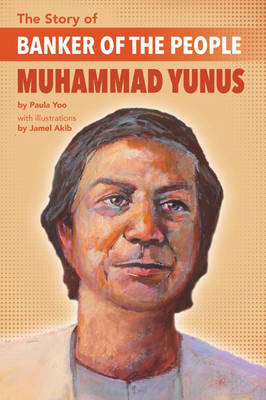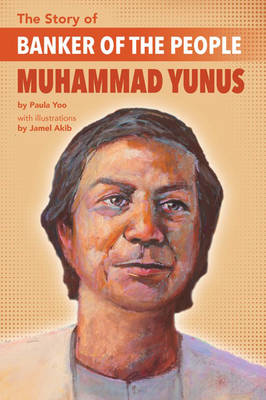
- Retrait gratuit dans votre magasin Club
- 7.000.000 titres dans notre catalogue
- Payer en toute sécurité
- Toujours un magasin près de chez vous
- Retrait gratuit dans votre magasin Club
- 7.000.000 titres dans notre catalogue
- Payer en toute sécurité
- Toujours un magasin près de chez vous
Description
This new entry in the innovative "Story" line of chapter-book biographies focuses on Nobel Peace Prize winner Muhammad Yunus, who revolutionized global antipoverty efforts by developing the innovative economic concept of micro-lending.
Growing up in Bangladesh, Muhammad Yunus witnessed extreme poverty all around him and was determined to eradicate it. In 1976, as an economics professor, Muhammad met a young craftswoman who needed to borrow five taka (twenty-two cents) to buy materials. No bank would lend such a small amount to an uneducated woman, so she was forced to borrow from corrupt lenders who charged an unfair interest rate, and left her without enough profit to buy food. Muhammad realized that what stood in the way of her financial security was just a few cents.
Inspired, Muhammad founded Grameen Bank, where people could borrow small amounts of money to invest in themselves or their own businesses, and then pay back the bank without exorbitant interest charges. Over the next few years, Muhammad's compassion and determination changed the lives of millions of people by loaning the equivalent of more than ten billion US dollars in micro-credit. He received the 2006 Nobel Peace Prize for establishing Grameen Bank and championing microfinance.
The Story of Banker to the People Muhammad Yunus is an inspiring account of economic innovation and a celebration of how one person--like one small loan--can make a positive difference in the lives of many. This chapter book includes black-and-white illustrations as well as sidebars on related subjects, a timeline, a glossary, and recommended reading.
Spécifications
Parties prenantes
- Auteur(s) :
- Editeur:
Contenu
- Nombre de pages :
- 96
- Langue:
- Anglais
- Collection :
Caractéristiques
- EAN:
- 9781643790060
- Date de parution :
- 06-08-19
- Format:
- Livre broché
- Format numérique:
- Trade paperback (VS)
- Dimensions :
- 135 mm x 206 mm
- Poids :
- 204 g

Les avis
Nous publions uniquement les avis qui respectent les conditions requises. Consultez nos conditions pour les avis.






